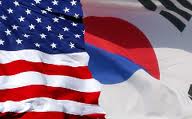
Agricultural News
Fear Not the Ides of March: KORUS Highlights Opportunities for U.S. Beef Producers
Tue, 10 Apr 2012 13:55:35 CDT

As the Korean-U.S. trade agreement begins taking effect, it represents a step to lowering trade barriers to U.S. beef around the world. Kent Bacus, the National Cattlemen's Beef Association's director of legislative affairs, wrote the following opinion piece hailing the welcome developments:
I'm not one who typically quotes Shakespearean literature but one thing I remember from high school is Shakespeare's Julius Caesar, where the soothsayer utters these ominous words to Caesar: "Beware the Ides of March." Historically, there's actually nothing ominous about the definition of Ides. It was used in the Roman calendar to denote the fifteenth day of March, May, July and October. For years, I've used that quote to remind my friends and colleagues of my ability to quote some of the great literary minds and not just Larry the Cable Guy. But in 2012, the Ides of March took on a brand new meaning.
March 15, 2012, marked the implementation of the Korea-U.S. Free Trade Agreement (KORUS). National Cattlemen's Beef Association President J.D. Alexander said KORUS "may very well be the most monumental bilateral trade pact our industry has ever witnessed." As the fourth largest export market for U.S. beef in 2011, Korean consumers purchased $646 million of U.S. beef and that is with the massive 40 percent tariff in place. Over the next 15 years, that tariff will be repealed at 2.67 percent per year. Some predict that U.S. beef sales in Korea could exceed $1 billion once fully implemented. The bottom line is our producers will be able to sell more U.S. beef at a more competitive price to Korean consumers. Truly, this is a great opportunity for U.S. beef and a positive step forward in opening and expanding market access for U.S. beef around the world.
One of the greatest opportunities awaiting U.S. beef is the Trans-Pacific Partnership (TPP). NCBA is encouraged that the United States is engaged in trade negotiations with all of the countries participating in the TPP negotiations (Australia, Brunei Darussalam, Chile, Malaysia, New Zealand, Peru, Singapore and Vietnam). TPP has the potential to be the beginning of a new era in global trade where tariff and non-tariff barriers are eliminated and standards are based on objective science instead of political protectionism.
For many years, U.S. beef has been subject to high tariff rates in many countries. This has been a tremendous trade barrier for U.S. beef, has hindered U.S. beef producers from reaching their full economic potential and has led to unnecessarily high prices for foreign consumers. For agriculture, eliminating tariff barriers in the TPP means producers in all countries will have improved market access to a larger base of consumers. For consumers, prices will be determined by market demand instead of being inflated by protectionist trade barriers.
In addition to eliminating tariff barriers, the United States must also make addressing non-tariff trade barriers a top priority in TPP negotiations. All TPP countries must agree to and abide by the highest sanitary and phyto-sanitary standards possible, in accordance with the World Trade Organization (WTO) and the World Organization for Animal Health. Allowing individual countries to use subjective standards will promote greater instability and will keep TPP from reaching its full potential. No exceptions can be made. Internationally recognized science must be the basis for SPS and all countries must abide by those standards in order for TPP to truly succeed. Once it is fully implemented, TPP will set the standard for future global trade pacts. That is why it is so important for the negotiators to get it right.
Another exciting and potentially prosperous development for U.S. agriculture will likely occur later this year. It is fairly well-known that Russia will join the WTO once the accession terms are approved by Russia's legislature later this year. As part of their accession agreement, Russia will expand market access for U.S. beef to 60,000 metric tons (frozen beef) and an unlimited supply of high quality beef at a 15 percent tariff rate. This will significantly expand access for U.S. beef to Russia, which was the fifth largest market for U.S. beef in 2011 accounting for more than $250 million in sales.
While the promise of greater market access is enticing, a few concerns remain with the non-tariff barriers. Given Russia's history of using unfounded standards to disrupt imports of U.S. pork and poultry, the U.S. beef industry needs assurances that Russia will implement and abide by internationally recognized, science-based standards for all proteins. In order for U.S. beef producers to expand their operations to meet demand in Russia, we need to know ahead of time that U.S. beef will not be subject to market-disrupting, non-science based standards.
Later this year, Congress may consider repealing a Cold War-era law commonly known as "Jackson-Vanik" and granting permanent normal trade relations status to Russia. Until that happens, U.S. beef producers will not benefit from the provisions of the Russia WTO accession agreement. For the benefit of all producers, we hope that our trade negotiators are able to get the necessary assurances in place so that U.S. beef producers can enjoy unfettered access to Russian appetites.
Without question, 2012 stands to be a pivotal year for advancing market access for U.S. beef and while we are very excited about the implementation of KORUS, we cannot afford to stop moving the proverbial ball forward. March 15 was not just important because it marked the beginning of implementation of a major free trade agreement. More importantly, the Ides of March is symbolic of the new, pro-trade fervor of the United States. Perhaps that gives new meaning to another quote from Shakespeare's Julius Caesar, "Caesar: The ides of March are come. Soothsayer: Ay, Caesar; but not gone."
WebReadyTM Powered by WireReady® NSI
Top Agricultural News
More Headlines...



















